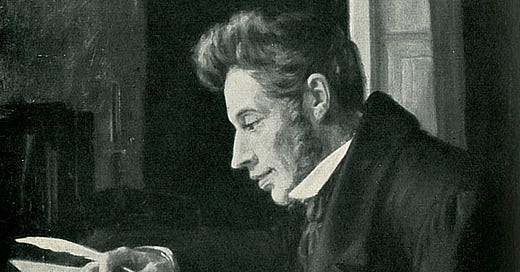TheGentleLaw Community
“Life can only be understood backwards; but it must be lived forwards.”
— Søren Kierkegaard
This simple yet profound sentence by the Danish philosopher Søren Kierkegaard has echoed across centuries and cultures. It captures a dilemma many of us encounter daily—how to make sense of our lives in real-time, when meaning often seems to reveal itself only in hindsight.
But who was Kierkegaard, and what can this thought teach us not only in the Western tradition but also when we view it through a Buddhist lens?
Søren Kierkegaard
Søren Aabye Kierkegaard (1813–1855) was a Danish philosopher, theologian, poet, and social critic, often regarded as the father of existentialism. He lived a short, intense life marked by deep introspection, spiritual searching, and personal suffering. Much of his philosophical work emerged from his own existential anxieties and his fraught relationship with Christianity.
Kierkegaard wrote under various pseudonyms, each representing different perspectives or "stages" of life: the aesthetic, the ethical, and the religious. He was concerned with how individuals confront despair, anxiety, and the ultimate responsibility of choosing their own path in life. For Kierkegaard, the central task of being human was not to seek abstract truths but to live truthfully.
Understanding Backwards
The first half of Kierkegaard’s quote—“Life can only be understood backwards”—is a recognition of how meaning often emerges only after the fact. We can’t fully grasp the significance of an event, a choice, or a relationship while we’re in the thick of it. It’s only when time passes—when emotions settle, and patterns begin to show—that understanding arises.
This is where we often find ourselves reflecting, perhaps with regret or with newfound clarity, on the "why" behind our earlier actions. Kierkegaard is pointing to the nature of experience itself: chaotic in the present, coherent in memory.
Living Forwards
But life must be lived forwards. Despite not fully understanding the consequences of our actions or the meaning of our experiences, we are called to act. Life flows like a river—we cannot pause it to understand every ripple. Instead, we must step into it and swim, trusting our intuition, values, and moment-to-moment awareness.
And this is where Buddhist teachings, surprisingly or not, speak to Kierkegaard’s insight with a quiet, profound harmony.
A Buddhist Parallel: Mindfulness and Impermanence
Keep reading with a 7-day free trial
Subscribe to The Gentle Law to keep reading this post and get 7 days of free access to the full post archives.




